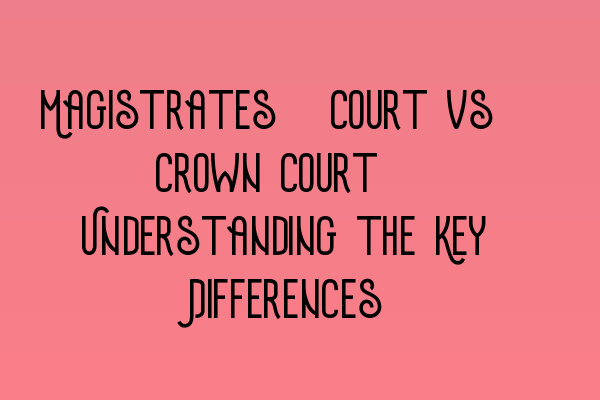Magistrates’ Court vs. Crown Court: Understanding the Key Differences
When it comes to legal proceedings in the United Kingdom, criminal cases are typically heard in either the Magistrates’ Court or the Crown Court. While both courts deal with criminal matters, there are some key differences between them that are important to understand. In this article, we will explore these differences to help you gain a better understanding of the two court systems.
Magistrates’ Court
The Magistrates’ Court is the lower court in the UK criminal justice system. This court is primarily responsible for handling less serious criminal offences, such as minor traffic violations, petty theft, and public order offences. Magistrates’ Courts are presided over by a bench of magistrates instead of a judge and jury.
Magistrates’ Courts are known for their efficiency and speed in handling cases. They have the power to issue fines, impose community orders, and even imprison offenders for a limited period. These courts also play a role in the early stages of more serious criminal cases, as they handle preliminary hearings and decide whether a case should be sent to the Crown Court for trial.
If you are facing a criminal charge that falls within the jurisdiction of the Magistrates’ Court, it is advisable to seek legal advice and representation to ensure your rights are protected. SQE Criminal Law & Practice Law UK offers comprehensive SQE 1 and SQE 2 preparation courses to help aspiring solicitors master criminal law and court procedures. You can also practice your knowledge with SQE 1 practice exam questions and SQE 1 practice mocks FLK1 FLK2.
Crown Court
The Crown Court, on the other hand, is the higher court in the UK criminal justice system. This court deals with more serious criminal offences, such as murder, drug trafficking, and complex fraud cases. Crown Court trials are presided over by a judge and a jury, and they have the power to impose longer prison sentences.
Unlike the Magistrates’ Court, the Crown Court does not have the authority to hand down a guilty verdict. Instead, it is responsible for determining guilt or innocence based on the evidence presented during the trial. If the defendant is found guilty, the Crown Court will then proceed to impose a sentence.
If your case is being heard in the Crown Court, it is essential to have a skilled criminal defense solicitor who can build a strong defense strategy on your behalf. SQE Criminal Law & Practice Law UK offers comprehensive SQE preparation courses to equip future criminal solicitors with the necessary knowledge and skills to excel in their careers. It is important to stay updated with SRA SQE exam dates to plan your preparation effectively.
The Differences
Now that we have a basic understanding of both courts, let’s dive deeper into the key differences between the Magistrates’ Court and the Crown Court:
- Nature of Cases: Magistrates’ Courts handle less serious criminal offences, while Crown Courts handle more serious and complex cases.
- Legal Representation: In the Magistrates’ Court, individuals can choose to represent themselves, but the Crown Court requires legal representation for all defendants.
- Verdict: Magistrates’ Courts have the power to issue guilty or not guilty verdicts, while Crown Courts determine guilt or innocence.
- Sentencing Powers: Magistrates’ Courts can impose limited prison sentences, fines, and community orders, whereas the Crown Court has the authority to hand down longer prison terms.
- Appeals: Decisions made by the Magistrates’ Court can be appealed to the Crown Court, while Crown Court decisions can be appealed to higher courts.
Understanding the key differences between the Magistrates’ Court and the Crown Court is crucial for anyone involved in or seeking a career in criminal law. Whether you aspire to become a solicitor or simply want to navigate the legal system effectively, SQE Criminal Law & Practice Law UK provides comprehensive SQE 1 and SQE 2 preparation courses to help you achieve your goals.
For more information on SQE preparation courses and SRA SQE exam dates, visit SQE 1 Preparation Courses and SQE 2 Preparation Courses.
Remember, proper legal representation is essential in both the Magistrates’ Court and the Crown Court, so don’t hesitate to seek professional advice to ensure your rights are protected.
